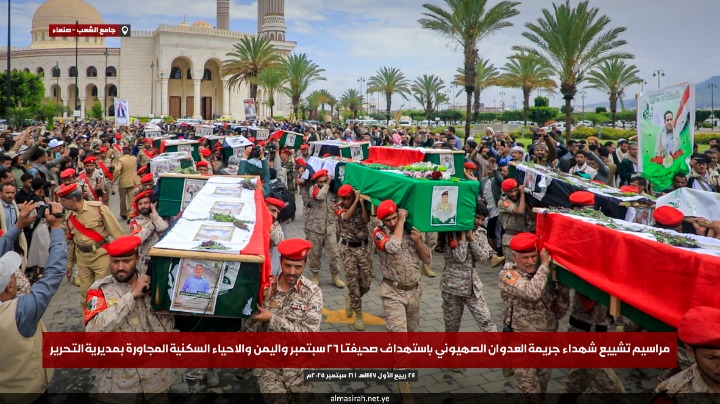Sana’a Bids Farewell to the “Martyrs of the Word”: 32 Journalists Killed in a Zionist Crime that United Yemenis Behind the Battle of Awareness
In a solemn funeral scene that encapsulated both the greatness of sacrifice and the brutality of the crime, Yemen on Tuesday laid to rest the bodies of 32 journalists martyred in the treacherous Zionist attack that struck the headquarters of 26 September and Al-Yemen newspapers in the heart of Sana’a.
The coffins, draped in national flags, were carried by grieving and enraged hands amid a wide official and popular presence, reflecting Yemen’s unity with the knights of the word who gave their lives while fulfilling their noble mission of exposing American–Zionist crimes against the peoples of the region.
Broad Official and Popular Presence
Leading the funeral procession were the Acting Prime Minister, Scholar Mohammed Moftah, the Grand Mufti of Yemen, Scholar Shams al-Din Sharaf al-Din, along with several state civil and military officials, social figures, and large crowds of citizens.
Funeral prayers were held at Al-Shaab Mosque in the capital before the martyrs were laid to rest—some in their hometowns, while 25 were buried in the Martyrs’ Cemetery in Sana’a’s Al-Rawdhah district.
Although grief was deep, it was blended with unbroken resolve, as mourners affirmed that the martyrs’ blood would serve only as fuel for the battle of awareness, and that the Yemeni people remain steadfast alongside Palestine and its resistance.
Condemnations and Firm Stances
Mourners expressed outrage at the heinous crime, carried out by targeting the densely populated Al-Tahrir neighborhood, describing it as one of the worst massacres committed against journalism and journalists worldwide.
They stressed that such crimes would not have occurred without U.S. and Western support, and the shameful inaction of Arab and Islamic regimes. They emphasized that this massacre reflects the true face of an entity founded on bloodshed and racism.
They also underlined that international silence and double standards in dealing with such crimes reveal the extent of global complicity with the Zionist project, holding the United Nations and international organizations responsible for their failure to protect journalists and human rights.
The Mufti’s Words: A Battle of Awareness and Media
In a moving speech during the funeral, Grand Mufti Shams al-Din Sharaf al-Din said the targeting of media professionals was a desperate attempt to silence the voice of truth and cover up the enemy’s crimes.
He explained that the targeting of journalists was no random act but part of a systematic policy within a strategy of blackout on genocide and starvation crimes committed in Gaza and the region.
He added: “The blood of these media martyrs will not be wasted; it will fuel the resilience of the Yemeni people and elevate their awareness, making it harder for the enemy to conceal its crimes.” He stressed that the nation’s battle with the enemy is not only military but also a battle of awareness and media.
He noted that Yemenis are offering their dearest in the path of God, and today journalists embody the front line of the word, with their sacrifices becoming a beacon for generations to come.
The Word Remains, and the Blood Bears Witness
Participants in the funeral considered the martyred journalists “a shining group crowned with the honor of martyrdom, men of the illuminating pen,” who fell while stationed on the front of the word, defending their nation’s causes and confronting the American–Zionist project aimed at subjugating the region and silencing the voice of resistance.
They stressed that targeting free media in Yemen, Palestine, Lebanon, and Iran will not succeed in hiding the truth; rather, it will only strengthen journalists’ determination to expose crimes and strip away the Zionist narrative.
A Farewell Worthy of the Sacrifice
The funeral procession turned into a cry of rejection against aggression and a clear message that the martyrs’ blood remains a trust upon the living, especially their comrades in the media. The Yemeni people vowed to honor their martyrs by continuing their path of resistance until the promised victory and liberation are achieved.
Amid fluttering national flags and the tears of the martyrs’ families, the scene conveyed one undeniable truth: the enemy’s bombs may kill bodies, but they cannot kill the word—and free journalism in Yemen will remain unextinguishable, no matter the brutality of aggression.

